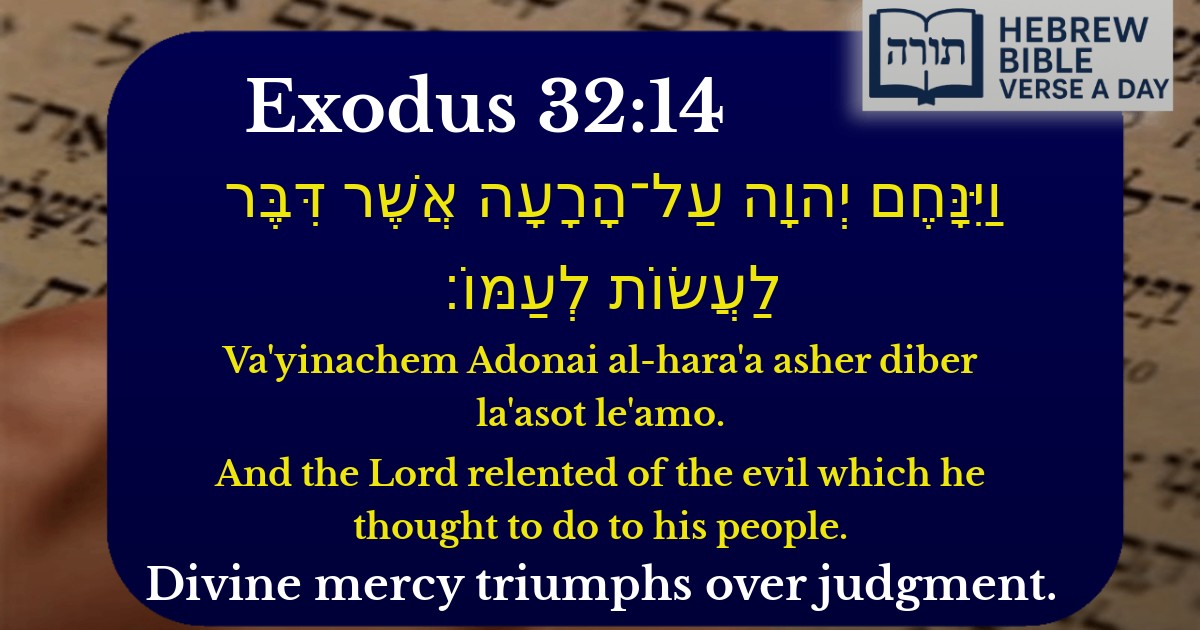Frequently Asked Questions
Q: What does it mean that 'the Lord relented of the evil' in Exodus 32:14?
A: This verse refers to Hashem's decision to withhold punishment from the Jewish people after the sin of the Golden Calf. According to Rashi, Moshe's prayers caused Hashem to show mercy and not destroy the nation as originally decreed. The 'evil' here refers to the severe punishment that was planned, not that Hashem does actual evil.
Q: Why is Exodus 32:14 important in Jewish tradition?
A: This verse teaches the power of repentance (teshuvah) and prayer. The Talmud (Berachos 32a) explains that Moshe's pleading with Hashem demonstrates that even a harsh decree can be reversed through sincere prayer. It establishes a foundational principle that Hashem is merciful and responds to the prayers of the righteous.
Q: How does Exodus 32:14 apply to our lives today?
A: The Rambam (Hilchos Teshuvah 2:4) teaches that this episode shows no situation is ever hopeless. Just as Hashem accepted the Jewish people's repentance after the Golden Calf, He accepts sincere repentance today. The verse reminds us that prayer and sincere change can alter even difficult circumstances.
Q: Does this verse mean Hashem changes His mind?
A: The Midrash (Shemos Rabbah 43:6) explains that Hashem's 'change' is from the perspective of human understanding. In truth, Hashem's plan always included the possibility of mercy if there was repentance. As Maimonides explains (Yesodei HaTorah 1:12), Hashem's ways are beyond human comprehension, and this language is used so we can relate to Divine justice.
Q: What lesson can we learn from Hashem relenting in this verse?
A: The Sforno teaches that this shows Hashem's great love for His people. Even after their serious sin, their repentance and Moshe's prayers brought forgiveness. This teaches that no matter how far one strays, returning to Hashem with a sincere heart is always possible, as emphasized throughout Jewish tradition regarding teshuva.


Understanding Divine Relentance
The verse states, "And the Lord relented of the evil which He thought to do to His people" (Exodus 32:14). This concept of Hashem "relenting" (וינחם) requires careful analysis, as it appears to describe a change in Divine decree. Traditional commentators address this apparent paradox—how an unchanging G-d can "change His mind."
Rashi's Explanation
Rashi (Exodus 32:14) clarifies that the term וינחם does not imply regret or change in the human sense. Rather, it reflects a shift from strict justice (middas hadin) to mercy (middas harachamim) due to Moshe's prayers and the people's repentance. The "evil" (הרעה) refers to the decree of destruction, which was averted through teshuva (repentance).
Rambam's Perspective
In Hilchos Teshuvah (2:4), the Rambam explains that Divine decrees are conditional—when people repent, the decree is nullified. This aligns with the principle that teshuva precedes creation (Pesachim 54a), meaning Hashem established repentance as a mechanism to alter decrees from the outset.
Midrashic Insights
Theological Implications
The verse teaches that Divine decrees are not immutable when met with sincere repentance. As the Talmud states (Berachos 10a), "Prayer can annul an evil decree." This reflects the dynamic relationship between human action and Divine response, where teshuva and tefillah (prayer) activate Hashem's mercy.